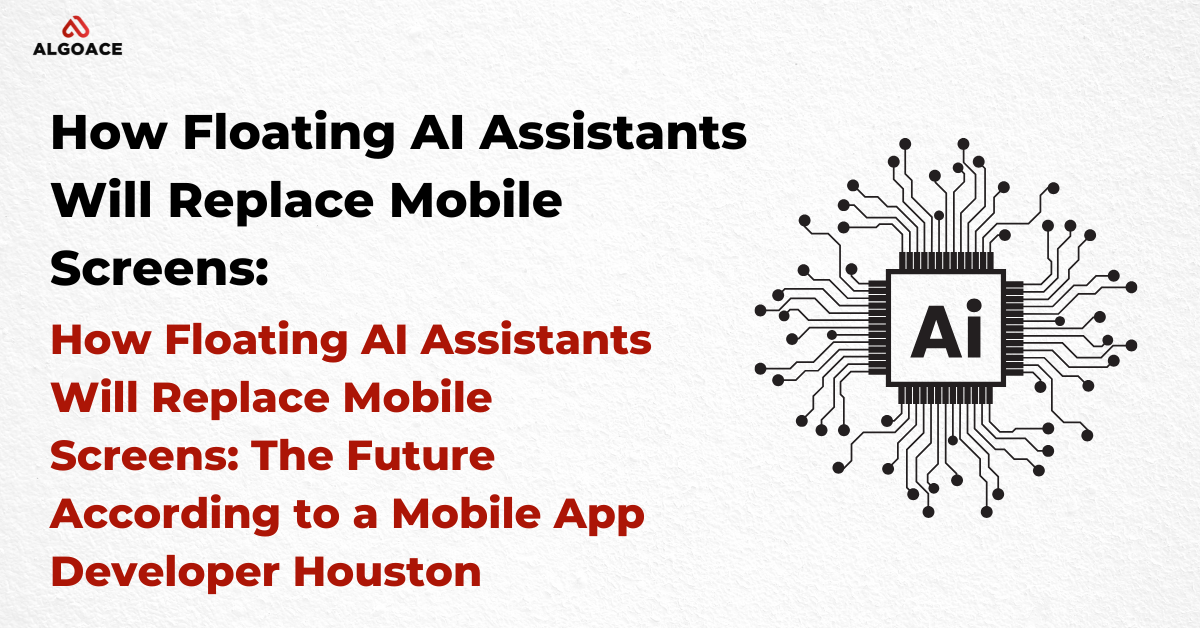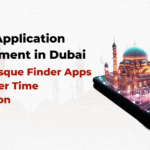
The realm of mobile technology is on the verge of a significant transformation. With the emergence of advancements in Artificial Intelligence (AI), Augmented Reality (AR), and Holography, conventional mobile screens are likely to become outdated. Floating AI Assistants—sophisticated, interactive digital entities—are set to take the place of mobile screens, providing users with an engaging and hands-free experience.
For Mobile App Developer Houston, this evolution brings forth both challenges and opportunities. The shift from touch-based interfaces to AI-driven holograms will revolutionize app development, necessitating innovative approaches from software development companies.
In this article, we will examine how Floating AI Assistants will alter the technological landscape, the significance of Mobile App Developers Houston, and the future of app design in this emerging post-screen era.
The Evolution of Mobile Screens: From Touch to Touchless
Mobile technology has evolved rapidly over the decades:
| Year | Major Innovation | Impact on Users |
|---|---|---|
| 1992 | First smartphone (IBM Simon) | Basic touchscreen with calling & email |
| 2007 | iPhone revolutionizes touchscreens | Intuitive UI, app store ecosystem |
| 2014 | Voice assistants (Siri, Alexa, Google Assistant) | Hands-free interaction |
| 2020 | AI-driven voice recognition improves | Smart homes & virtual assistants |
| 2025+ | Floating AI Assistants emerge | Full voice & gesture control without screens |
As we advance into an era dominated by AI technology, Mobile App Developers Houston need to modify their development approaches to design applications that are hands-free and immersive.
What Are Floating AI Assistants?
Floating AI Assistants are advanced holographic entities powered by artificial intelligence, designed to engage with users through voice commands, hand gestures, and even brainwave activity. Unlike conventional mobile applications, these assistants operate in augmented reality, free from the constraints of traditional screens.
Core Features of Floating AI Assistants
✔️ Holographic User Interface: Presents information in three-dimensional space
✔️ Voice and Gesture Interaction: Eliminates the need for physical contact
✔️ Contextual Intelligence: AI learns and adapts to user habits
✔️ Effortless Cloud Connectivity: Functions seamlessly across various devices
✔️ Instant Translation and Support: AI-generated responses available in multiple languages
🚀 Insight: A report from Markets and Markets indicates that the global market for AI assistants is projected to reach $52 billion by 2028, underscoring the growing dependence on AI-driven technologies.
How Floating AI Assistants Will Replace Mobile Screens
The age of mobile screens is nearing its conclusion as Floating AI Assistants transform digital interactions through voice, gesture, and augmented reality experiences. For a Mobile App Developer in Houston and experts in Enterprise Mobile Development Miami, this transition offers a groundbreaking opportunity to create screen-free, AI-driven applications that redefine how users engage with technology.
1. Hands-Free, Screen-Free Interaction
Conventional smartphones depend on touchscreens for user interaction; however, Floating AI Assistants will facilitate gesture-based and voice-activated communications, thereby removing the necessity for physical screens.
💡 For instance, rather than viewing notifications on a mobile device, a holographic AI assistant will display them in your immediate vicinity, enabling interaction without the use of hands.
2. Augmented Reality Enhancements
With the advancements in augmented reality, mobile app developers Houston are set to create applications that present information seamlessly within the real world.
💡 For instance, rather than relying on a GPS application displayed on a screen, users will be able to view a hovering map that directs them through streets enhanced by augmented reality.
3. AI-Powered Personalization
AI-powered assistants will adapt to individual user preferences, offering highly personalized recommendations.
📊 Statistic: According to research conducted by PwC, 72% of users favor AI-generated recommendations compared to standard suggestions.
4. Integration with Smart Devices
Floating AI Assistants will effortlessly connect with smart home devices, Internet of Things (IoT) gadgets, and wearable technology.
💡 For instance, rather than needing to unlock a smartphone to modify the thermostat, users can merely request the floating AI assistant to adjust the temperature.
5. No More Physical Device Limitations
AI assistants operating on cloud computing platforms will eliminate the necessity for costly hardware, requiring only lightweight augmented reality glasses or AI-integrated contact lenses—a game-changing advancement that South Florida App Developers are actively exploring for next-gen applications.
📊 Market Projection: By the year 2030, it is anticipated that 70% of mobile applications will be developed for voice and augmented reality interfaces, thereby diminishing dependence on conventional screens.
The Role of a Mobile App Developer Houston in This Transformation
As Floating AI Assistants gain widespread adoption, Mobile App Developers Houston will need to make several adjustments, including:
🔹 Creating AI-Integrated Applications – Applications should be designed to accommodate voice commands, gestures, and real-time holographic displays.
🔹 Strengthening Security and Privacy – Given that AI assistants manage sensitive user information, robust cybersecurity protocols are essential.
🔹 Enhancing Edge Computing Capabilities – AI assistants depend on low-latency interactions with the cloud, necessitating the development of efficient application architectures.
🔹 Partnering with Software Development companies – Advancements in AI, IoT, and AR will necessitate collaboration across various industries.
Key Insight: To remain competitive in the post-screen era, software development companies must prioritize investments in AI-driven frameworks and AR-based platforms.
Challenges in Adopting Floating AI Assistants
1. Data Privacy & Security Risks
- AI assistants handle sensitive personal information, rendering them vulnerable to cyberattacks.
- Solution: Implementing blockchain-based security for user authentication.
2. User Adaptability & Learning Curve
- A significant number of users continue to favor tangible devices rather than voice-activated artificial intelligence.
- Solution: Incremental incorporation of AI into current mobile platforms.
3. Development Complexity
- Developing holographic applications that leverage artificial intelligence necessitates a high level of proficiency in machine learning, natural language processing, and augmented reality development.
- A viable approach is to foster partnerships between mobile app developers Houston and companies specializing in AI research.
📊 By the year 2035, it is anticipated that more than 1 billion individuals will utilize Floating AI Assistants as their main digital interface.
Future Trends: The Next Frontier for Mobile App Developers
| Trend | Impact on Mobile App Developers |
|---|---|
| AI-Enhanced User Experience | Personalized AI assistants replacing static app interfaces |
| Brain-Computer Interfaces (BCI) | Hands-free, thought-controlled applications |
| Holographic Displays | Apps with 3D floating interfaces replacing screens |
| 5G & 6G Networks | Faster AI processing and seamless real-time interactions |
| Smart Glasses & Contact Lenses | AR-based assistants replacing smartphones entirely |
🔥 As technology continues to advance, Mobile App Developers Houston must acquire expertise in artificial intelligence, augmented reality, and cloud computing to maintain their competitive edge.
Conclusion
Floating AI Assistants are transitioning from a mere futuristic idea to a tangible reality. Mobile App Developers Houston needs to evolve by integrating AI-driven, screen-free applications to maintain a competitive edge.
Key Takeaways:
✅ In the forthcoming decade, floating AI assistants are poised to supplant mobile screens.
✅ The landscape of application development will be primarily shaped by voice, gesture, and AI-driven interfaces.
✅ It is imperative for software development companies to allocate resources towards advancements in AI, augmented reality, and cloud-based technologies.
✅ Mobile app developers Houston ought to prioritize security, personalization, and the smooth integration of AI functionalities.
🚀 The shift from mobile displays to AI-driven floating assistants is unavoidable. The pertinent question is: Are you prepared to develop the applications of tomorrow?





0 Comments